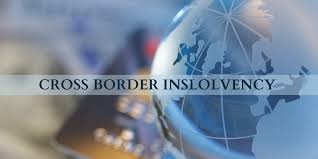
Cross border insolvency laws in India
Cross border insolvency laws in India
Transnational transactions that take place globally are referred to as cross-border bankruptcy. Debtors and creditors are created through international transactions, which transcend national boundaries. Cross-border bankruptcy happens when a debtor files for bankruptcy in more than one jurisdiction, or when the debtor has assets or creditors spread across many jurisdictions.
Laws pertaining to cross-border insolvency:
• The 'Insolvency and Bankruptcy Code' (IBC), passed by India in 2016, is a unique statute.
• The primary objective of the law is to establish a uniform framework for promptly resolving insolvencies involving corporations, partnerships, and individuals.
• It also offers financially distressed corporate enterprises rehabilitation, assisting in their recovery.
Sections 235 and 234 of the IBC.
Pursuant to section 234 of the IBC, the Central Government may enter into bilateral agreements with foreign authorities for the settlement of transnational bankruptcy proceedings.
Section 235 grants the Adjudicating Authority the power to lodge letters of request to the courts of the country with whom the bilateral agreement has been entered into under Section 234 in order to manage the fate of the corporate debtors' assets that are situated outside of India.
The code's two-pronged insolvency procedure seeks to prevent company failures by assisting debtors in making informed decisions and providing guidance.
IBC 2016's limitations
currently, the IBC handles insolvent businesses founded in India and mostly adheres to Indian rules. On the other hand, because trade and technology have advanced so quickly, the globe has become smaller. In the corporate sector, there are an increasing number of multinational companies promoting cross-national commercial ties. When a company operates internationally, creditors and debtors locate themselves abroad, which causes legal procedures and regulatory frameworks to overlap. For this reason, even though IBC has simplified the bankruptcy process in India, there are insufficient rules provided for the administration of cross-border insolvency operations.
• The Insolvency Law Committee ("ILC") was created by the Indian Ministry of Corporate Affairs to examine and evaluate the application and functioning of the Insolvency and Bankruptcy Code, 2016 ("IBC"). Reporting to the ILC
• Suggested that the UNCITRAL Model Law on Cross-Border Insolvency ("Model Law") be adopted in order to resolve cross-border insolvency problems in India, and that the country's present insolvency system be reevaluated since it did not comply with international norms.
UNCITRAL's Model Law on Cross-Border Insolvency from 1997:
- More than 40 countries with a variety of legal systems collaborated to create the UN Commission on International Trade Law's (UNCITRAL) 1997 Model Law on Cross-Border Insolvency.
The United Nations General Assembly established the United Nations Commission on International Trade Law in 1966, making it the principal legal authority within the UN on the topic of international trade law. - The four fundamental tenets of the UNCITRAL Model Law are recognition, collaboration, coordination, and access. It aims to provide direct access to domestic courts for international specialists and creditors, enabling them to take part in and/or start domestic bankruptcy proceedings against the concerned debtor. Regarding recognition, the UNCITRAL Model Law deals with the acceptance of foreign procedures in national courts and gives judges the authority to choose what remedies are acceptable to grant.
India's acceptance of the UNCITRAL framework :
- India has created a set of proposed regulations that include a specific chapter on cross-border insolvency known as Part Z ("draft chapter") in an attempt to address the issues with the present cross-border bankruptcy process—or lack thereof. With a few minor modifications, these suggested proposals are based on the UNCITRAL Model Law.
- Throughout India. The ILC recommended the adoption of a Model Law in its two-part research to address concerns regarding cross-border bankruptcy in India. The Model Law served as a major source of inspiration for the development of Draft Part Z, which the ILC created for the second section of the Report and included many of its key components.
- In order to apply the UNCITRAL Model Law on Cross-Border Insolvency 1997 (the "Model Law"), India is currently finalizing revisions to the IBC.
In the case of Uphealth Holdings INC. vs. Dr. Syed Azim & Ors. (2022 SCC Online Del 1260), the Calcutta High Court ruled that Indian courts are not required to stay ongoing suits due to foreign proceedings because they do not recognize or enforce moratorium orders from non-reciprocating countries, like the United States.
Conclusion:
The passage of the Model Law will open the road for India to recognize international bankruptcy orders admitting a corporate debtor into insolvency proceedings, resulting in protective relief for the corporate debtor's assets in India. The UNCITRAL Model Law, in essence, provides a reasonably autonomous framework that allows the relevant jurisdiction to examine and, as a result, decide on the operational details that are most suited to that country's legal landscape












comments